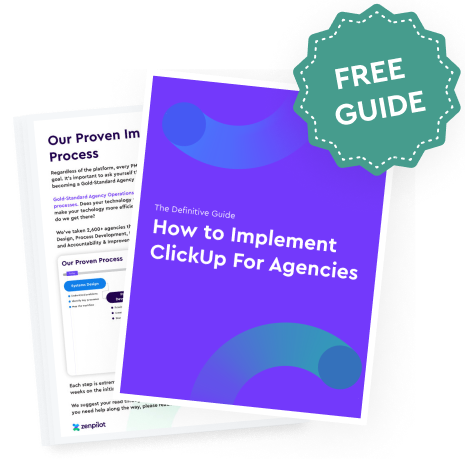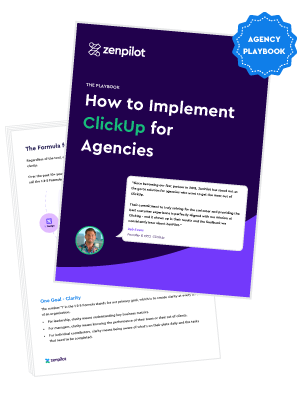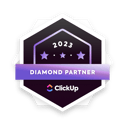The Demise of Third Party Cookies, What Agencies Should Do About It, and an AI-Based Solution (feat. Paris Childress, Hop Online)

Third party cookies have played an instrumental role in digital advertising over the past couple decades.
However, big changes are on the horizon that will eliminate third party cookie tracking.
This is expected to create a "massive loss of signal" used to target and optimize ads, according to Paris Childress, our recent guest on the Agency Journey podcast.
As the CEO of performance marketing agency Hop Online, Paris keeps a pulse on digital advertising and privacy trends. He predicts major implications for both agencies and advertisers from the impending loss of third party cookie data.
On the podcast, Paris gave his take on why there is lack of preparation for this change and how agencies can help their clients come out ahead.
He also highlighted an AI solution his agency has developed to leverage first party data in this new environment.
To dive in-depth into Paris' thoughts, watch the full episode here:
Or go here to listen to the episode on your favorite podcast platforms.
If you prefer a scannable, written summary...
Let's dive into the details around:
- why Childress believes this cookie change will significantly impact return on advertising spend;
- steps agencies should be taking;
- technology that can help fill the data gap;
- how this change might influence your upcoming agency recruitment decisions.
The State of Affairs on Third Party Cookie Tracking
First, a quick recap: what are third party cookies?
Third party cookies are pieces of tracking code that allow advertisers to identify users across websites. By following browsing behavior, they enable highly targeted ads personalized to individuals wherever they travel online.
However, third party cookie tracking has major privacy implications.
Google has faced increasing pressures around user data collection and announced plans to phase out this tracking in Chrome.
According to Childress, expectations are currently for third party cookies to be fully sunset by the beginning of Q4 2024. That's roughly one year from now.
Childress admits Google does have alternate tracking plans in the works for after third parties get removed (known as the "Privacy Sandbox"). But he believes in the interim, digital advertising is facing major identity resolution problems.
When third party cookies go away, most of the data used today for targeting, optimizing, and reporting ads will essentially evaporate.
Related: Agency Client Onboarding: The Exact Process To Follow [+Free ClickUp Template]
Why Paris Believes This Will "Tank" Ad Spend ROI
In Paris' eyes, most players in the digital marketing industry don't grasp the significance of losing third party cookies:
"I don't think people fully appreciate how how influential that little cookie is. When that goes away (...) I think that there's going to be a window where there's going to be a massive loss of signal.
"And in order to preserve return on ad spend, advertisers—particularly those that are spending good amounts with Google primarily—if they don't supplement that data loss with something else, then their their return on ad spend potentially could tank."
This strongly negative reaction may sound overly harsh.
However, it's important to understand what types of highly optimized programs Paris primarily works on.
As a performance marketing agency, Hop Online manages large paid search, shopping, display and other digital initiatives.
These campaigns hinge on in-depth tracking and attribution to identify target users and dial in cost per conversion.
Losing third party cookies doesn't just introduce temporary inaccuracies. It eliminates the ability to individually track users across sites.
Previous targeting and bidding decisions would become far less informed. Dramatically reducing available data can cripple the relevancy audiences see and completely throw off the consistency of backend optimization routines.
According to Paris, this can quickly spiral campaigns downwards when they have no visibility into granular user behavior:
"So when cookies finally sunset next year, I think people are going to be scrambling, including agencies, for these first-party data solutions. (...) So we're trying to get out ahead of that curve a little bit—sometimes I feel like we're still a bit too early on this—but I think think we're heading in the right direction with pLTV."
(pLTV is Paris' AI-based first party data solution—more on that in a second.)
Benchmark Your Agency Ops
Take the Agency Project Management Benchmark Assessment to see how your operations stack up against 3,000+ other agencies.
Agencies Should Focus on Crafting First-Party Data Strategies
Paris strongly advocates that preparing first party data strategies needs to be the main priority for agencies in the lead up to the death of third party cookies.
This involves not just optimizing within walled gardens, but bringing in external data to fill gaps left behind by third party tracking going away:
"What they need to substitute that with is their their own first-party data. And so we have been strong proponents for the last year, maybe year and a half, of trying to work with clients not only to optimize their advertising in the platforms, but to get their first party data and bring that first-party data into the platforms.
"So it's more important in the years ahead to be able to understand how to craft a first-party data strategy for clients and bring data that Google doesn't have into Google as opposed to being a a black belt at optimizing inside of the platforms."
For many agencies, developing robust first party data strategies will require expanding competencies into customer data and analytics.
This might involve:
- setting up a customer data platform (CDP),
- building data lakes,
- or leveraging cloud-based business intelligence tools.
It could also require technical hires like data engineers to consolidate sources and organize data for marketing use cases.
No matter what stack they enable, Paris argues agencies need to embrace strategies centered around owned first party data to stay ahead of the curve.
Direct integrations with advertising platforms using this data will likely differentiate agencies as cookie tracking goes away.
Related: 7 Agency Project Management Lessons from 8 & 9-Figure Agencies
How the pLTV Solution Leverages First Party Data
Paris and the data science team at Hop Online recognized this trend towards first party data dependency emerging years ago.
In response, they began building a machine learning solution called pLTV (Predictive Lifetime Value) to provide forward-looking analytics for advertising.
The pLTV engine crunches first party behavioral signals collected during and after customers initially sign up.
This includes their product usage, purchase patterns, profile information and any other observable metrics.
Advanced AI modeling then looks for predictive patterns in metrics most correlated to longer term customer value.
These insights get used to score incoming users on expected lifetime value (LTV) extremely quickly after someone converts.
According to Paris, the goal is predicting a reasonably accurate LTV "somewhere between 24 hours to 72 hours" into the customer lifecycle.
Feeding actionable LTV scores directly into advertising platforms unlocks smarter bid optimization based on true return potential. This powers "value-based bidding", where bids dynamically align to target more valuable predicted users.
Connecting external first party insights into platforms is a great example of the integration and analytics strategies Paris argues agencies should develop expertise around.
The following quote summarizes why Childress believes leveraging first party data to enable value based bidding will become a huge priority:
"The reason why pLTV matters is that that can become a conversion event for value-based bidding. Value-based bidding is bidding on target return on ad spend—which is how e-commerce has been doing it probably for the last 10 or 15 years.
"But [SaaS companies] have a very difficult time knowing: 'What is my CAC? What is my CAC ceiling?' because I don't know the lifetime value and I'm optimizing I should be optimizing towards LTV to CAC and my investors want my LTV to CAC to be 3:1 or better...
"So we're trying to help companies with recurring revenue predict LTV at the point of acquisition so that they can lock in LTV to CAC ratios and they can optimize for that with their ad spend."
While still undergoing development, Paris envisions eventually productizing pLTV as a turnkey solution agencies can implement for clients to value based bidding and stronger optimization.
Related: ClickUp AI - A Step-By-Step Guide for Agencies
Key Takeaways on Planning for a Third Party Cookie-Less World
If agencies don't want to be left behind and lose effectiveness in their advertising programs, Paris strongly believes now is the time to plan for a future without third party cookies.
His core recommendations for agencies:
- Prioritize expanding first party data strategies and integrations. Look at building or accessing tools like CDPs that can leverage first party behavioral signals.
- Hire for analytics talent and data science capabilities. These skillsets will only grow in importance with more dependency on owned data assets.
- Keep an eye on emerging solutions leveraging first party data for advertising. Something like pLTV can provide forward-looking modeling for smarter bid optimization.
It may only be a year or so until third party cookies meet their end. But agencies and advertisers taking the right steps now to build out first party data capabilities can turn this privacy headline into a competitive advantage.
BONUS
Download the Complete ClickUp for Agencies Guide FREE
The 47-page guide includes graphics, checklists, and links to how-to videos so you can actionize your ClickUp plan.

Be sure to check out the full Agency Journey podcast episode with Paris for his insights on many other great topics like:
- The origin story and early successes of hop online
- How they overcame worries to fully switch their agency's CRM into ClickUp
- Tips for getting value from hosting a B2B marketing podcast
- Why agency owners should focus more on developing their personal brand
- The future vision for pltv and early traction they've received
Related: How to Increase Your Agency's Profit Margins Over Time (feat. Chris Dreyer, Rankings.io)
The AI Future Means Project Management Is More Important Than Ever
Agencies will have to navigate a ton of important changes in the coming months.
That includes the sunsetting of third party cookies, the rising importance of first-party data, and the ongoing AI revolution.
But one thing about the future of the industry is very clear:
Having good, clean data on your agency's work has never been more important.
Building a single source of truth for your work in a reliable PM tool (such as ClickUp or Teamwork.com) was already a good idea due to the efficiency gains.
But now, your process documentation might become the foundation of the data you'll soon feed into your agency's "AI second brain".
If data on your projects is fragmented, incomplete, and inconsistent, now is past time to do something about that.
Thankfully, you're in the right place to get the solution.
At ZenPilot, we equip agencies with the right processes, habits, and tools to build a single source of truth for all of your work, systematize your SOPs, and uncover data on your utilization and profitability.
Check out our ClickUp for Agencies guide or Teamwork.com for Agencies guide to get started.
Or go here to find out more about how we can partner up with you.
Don't forget to subscribe to Agency Journey if you haven't already, and I'll see you in the next one!






